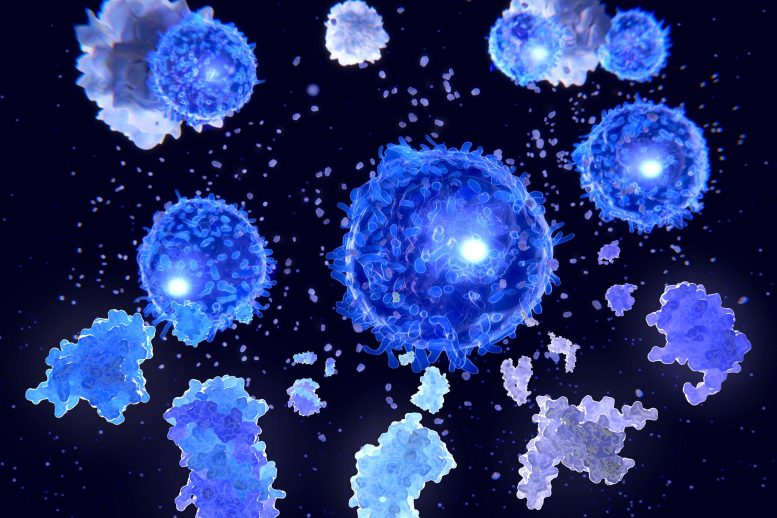COVID-19 Research: New Study Reveals That Specific Types Of T-Cells Are Targeted By The SARS-CoV-2 Coronavirus In Patient’s Immune System
Source: COVID-19 Research May 27, 2020 4 years, 10 months, 3 weeks, 1 day, 4 hours, 23 minutes ago
COVID-19 Research: Medical researchers from the Francis Crick Institute, King’s College London and Guy's and St Thomas' NHS Foundation Trust, have conducted a detailed analysis of the composition of immune cells in COVID-19 patients’ blood to fully understand how the SARS-CoV-2 coronavirus affects the immune system in order to help doctors predict at an early stage who might need additional treatments or critical care, and act as a guideline for treatment strategies.

One of the main findings is that specific types of T-cells in the immune system are particularly targeted by the novel coronavirus and that a treatment protocol with recombinant IL-7 might help.
The research findings based on the detailed preliminary analysis of 60 COVID-19 patients at St Thomas’ Hospital identified an ‘immunological signature’ of the disease. Within this, a small set of factors, or clues, could be used to identify the patients most likely to do worse and require additional treatment.
https://www.immunophenotype.org/wp-content/uploads/2020/05/COVID-IP_220520-FCAHv52.pdf
In the research findings, the medical scientists have identified two prominent clues:
-Firstly an overt dysregulation in a specific type of T cell that ordinarily eradicates virus-infected cells,
-Secondly a dramatic loss of immune cells called basophils that can be involved in tissue repair.
Dr Adrian Hayday, the research leader who heads the Crick’s Immunosurveillance Laboratory and is Professor of Immunobiology at King’s College London, told Thailand Medical News, “The changes we have observed in the blood are not subtle and patients with these features seem more likely to experience severe disease, requiring intensive management.”
The research team hopes that a blood test with this high level of resolution could be more broadly applied in hospitals to seek early indications of patient condition, and to effectively help prioritize treatments.
Although lymphocyte and basophil counts are currently part of a patient’s tests during hospital treatment for COVID-19, a more sensitive and granular method of analysis is needed to optimally inform treatment. The team hopes their detailed analysis will give doctors a more accurate indication of what’s happening to the patients’ immune systems.
The research findings into how COVID-19 affects the body could also help inform studies looking to develop effective treatments and vaccines. For example, if researchers can uncover how the virus perturbs the workings of essential T cells, they could prioritize immune treatments and vaccines that promote those T cell activities.
Dr Hayday added, “There is a lot we still do not know about this virus, but we have seen that it doesn’t simply discriminate according to age and underlying condition. Although in smaller numbers, younger, healthy individuals can also be struck down with severe symptoms. We need to be at a point where clinical treatment decisions can be guided by the state-of-the-art knowledge of the immune system. Indeed, this is why
we’re making our data rapidly and freely available so that it can be used across the world by those investigating new avenues for treatment.”
For the ongoing study called COVID-IP, patients at Guy’s and St Thomas' who have agreed to donate to an infectious disease biobank, provide regular blood samples during their treatment for COVID-19. These are processed in secure containment at Guy’s Hospital before the composition and properties of immune cells are analyzed in the team’s laboratories at King’s College London and at the Crick.
In the observation of specific types of T cells, it is observed that in some patients, the virus is skewing the immune response and simply knocking out one of the body’s most critical natural defenses.
In a situation when patients cannot mount an effective T cell response, there are not enough immune cells to clear the body of virus-infected cells. And as this situation persists and worsens, the remaining immune cells can become misguided, themselves causing damage to the lungs and other vital organs.
Dr Manu Shankar-Hari, Reader and Consultant in Intensive Care Medicine at King’s College London, consultant in intensive care medicine at Guy’s and St Thomas’ NHS Foundation Trust, and NIHR Clinician Scientist said: “We routinely measure white blood cell counts, including lymphocyte and basophil counts in all hospitalized patients. Clearly, our new COVID-IP study highlights the enormous potential to measure the status of very specific types of immune cell involved in fighting the virus.”
He further added, “Moreover, the study’s identification of detailed T cell deficits offers strong support for an international clinical trial in which we provide patients with recombinant IL-7, a natural drug that promotes T cell function. The trial has been designated an Urgent Public Health COVID-19 Trial by the Chief Medical Officer.”
The team is expected to start clinical trials of recombinant IL-7 sometime next month.
For more on
COVID-19 Research, keep logging to Thailand Medical News
We Desperately Need Your Help. Please Help To Sustain This Website And All Our Initiatives To Propel Research By Donating. https://www.thailandmedical.news/p/sponsorship
